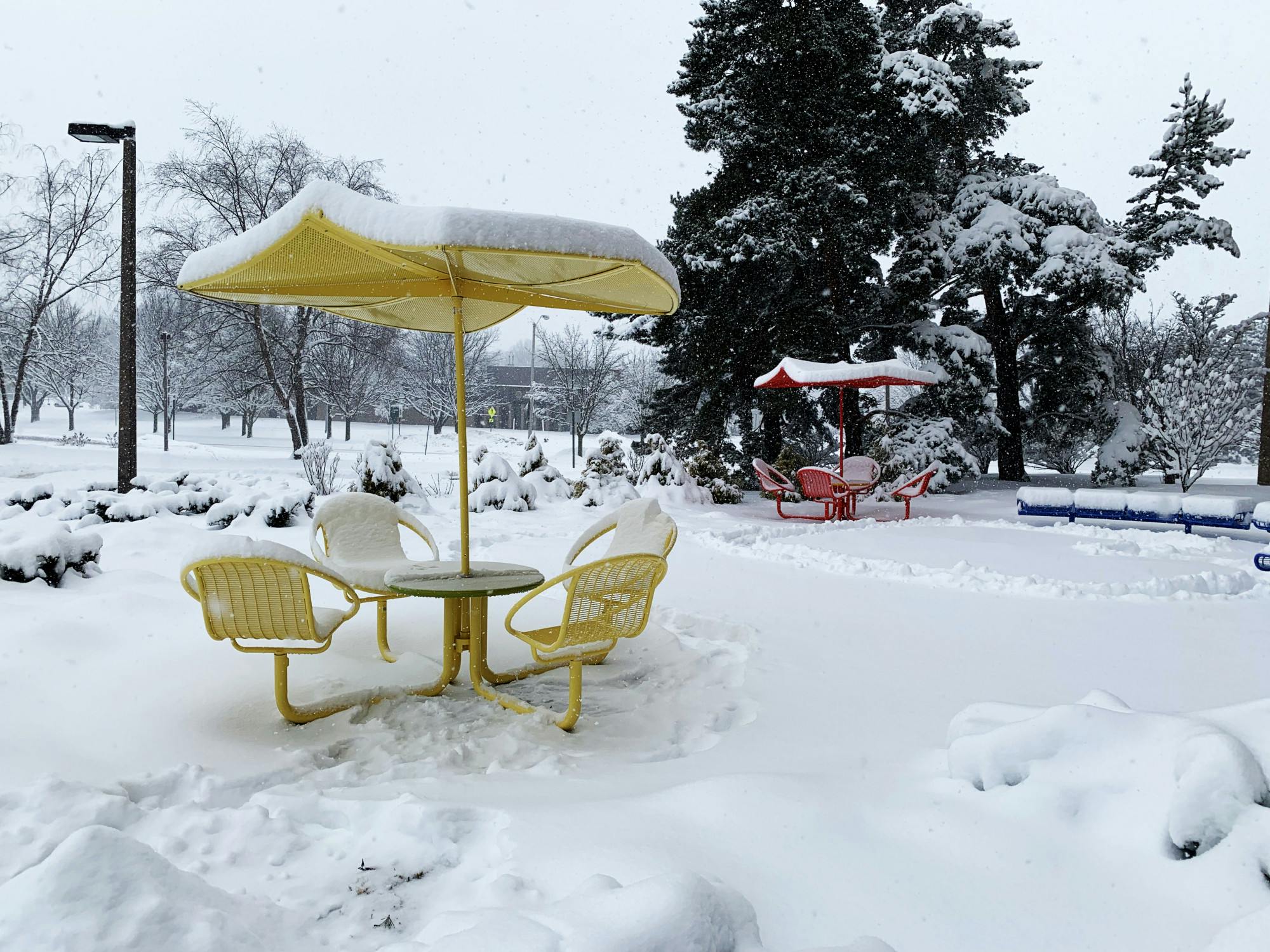Low temperatures will remain consistent throughout the first weeks of February as classes remain in person. Despite the cold, it is imperative that students living on and off-campus remain safe and know the dangers associated with frostbite.
On Jan. 1, East Lansing City Manager George Lahanas, with approval from Mayor Ron Bacon, issued a snow emergency until Feb. 4, associated with the winter storm across East Lansing. Since the end of the snow emergency last Wednesday, snowplows can often be seen driving through busy streets like Grand River Avenue and Shaw Lane clearing lanes as snow continues to fall.
The average high for this week’s forecast will be 34 degrees, and a low of 13 degrees. Thursday has an 80% chance of snow. As wind fluctuates between 11-14 miles per hour, walking to class could prove hazardous without proper outerwear.
“I live off-campus in a co-op,” psychology junior Anna Parcells wrote in an email. “My walk from class to class is usually about 15 to 20 minutes. I used the busses much more in the fall semester when they were more easily accessible … I typically wear gloves every day, at least always having them on me as my fingers get cold really fast.”
For linguistics sophomore Whitney Kuta, walking over frozen sidewalks and taking it slow means making it to class on time or not.
“Walking to classes I probably spend about 15 to 20 minutes depending on how I see the sidewalks are,” Kuta said. “Although on the way back from my classes sometimes it's a little bit longer especially if I need to stop by Grand River to buy something.”
Frostbite is when a part of the body without central heat freezes due to prolonged exposure to the cold, damaging underlying tissue in the skin, such as toes, fingers and tips of ears. While not common, temperatures below 20 degrees with windchill value at 18-below-zero, hypothermia and frostbite exposure can occur in as little as 15 minutes. Frostbitten skin is cold to the touch and has a wax-like consistency as damaged skin dies and must be removed.
Frostbite is easily preventable – layering up in several loose layers covering hands and feet in water-resistant clothes protects the body from the bitter cold outside.
Director of Student Health Services Dr. Keith Nelson advised for proper clothes to protect against frostbite in East Lansing if the weather dips below freezing.
“To protect against frostbite, dress in loose, comfortable layers and pay extra attention to protecting your head and face, as well as extremities like fingers and toes,” Nelson wrote in an email. “Stay dry, keep hydrated and minimize time outdoors on windy days. Be sure to warm the affected area immediately if you begin to feel tingling, numbness or pain.”
Nelson said to seek immediate medical attention if you notice swelling, changes in skin color, fever or blistering.
While frostbite takes minutes to set in and damage the skin, the earliest stage of frostbite is called frostnip. Symptoms of frostnip include prickling skin feeling before becoming numb, followed by inflamed and discolored pink skin. Frostnip does not cause permanent damage yet, if experienced, the afflicted should immediately return to heat inside a building.
“Frostnip is an early stage of frostbite,” Nelson wrote. “You might notice numbness in the affected area, and you may feel pain or tingling as your skin warms. Gradually rewarm the area, being careful not to submerge the area in hot water.”
Keeping all your body parts warm with frequent trips indoors and fuzzy mittens, no matter how cold outside it is – frostbite won’t be something you’ll have to worry about.
For Kuta, her Michigan State scarf she got a hockey game is more than warm enough, the coat can stay at home.
“In the winter, I usually just walk around in jeans and a men's thermal shirt and a scarf,” Kuta said. “Usually, that's plenty warm for me!”
Remember to stay safe during winter classes as snowfall is projected at an 80% chance on Thursday, Feb. 17. Frostbite cases are generally rare on campus but don't take that for granted and go out in running shorts – you could be the exception.
The Olin Health Center is located at 463 East Circle Drive and is open from 8 a.m. to 5 p.m. Monday through Friday. To schedule an appointment call 517-353-4660 or 517-884-6546 for general information. Primary care for illness and minor injuries is available at five locations across campus in smaller neighborhood clinics that can be found here.
Support student media!
Please consider donating to The State News and help fund the future of journalism.
Discussion
Share and discuss “Fuzzy mittens and frostbite: How to stay safe this winter season” on social media.







